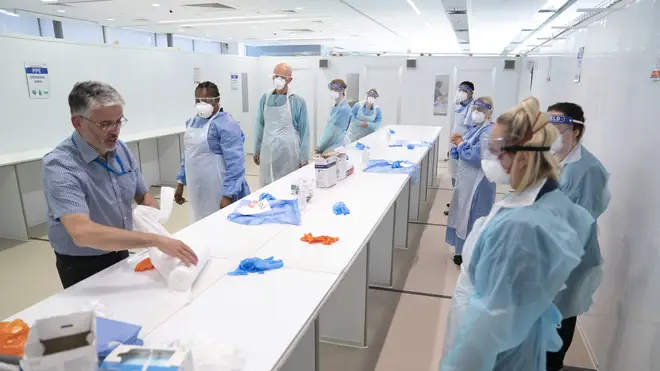
Lewis Goodall 10am - 12pm
23 April 2020, 06:29

A potential Covid-19 vaccine which is being developed at the University of Oxford will be tested on people from Thursday with the aim of a million doses by September.
Health Secretary Matt Hancock confirmed £41 million of additional funding for coronavirus vaccine research taking place at Oxford University and Imperial College London, with approval for human trials to start on Thursday at Oxford.
Scientists at Oxford have previously said the aim is to produce a million doses of the vaccine by September.
Addressing a Downing Street briefing Mr Hancock praised both teams for making “rapid progress” and said the UK will throw “everything we’ve got” at developing a vaccine.
He confirmed the Government would invest in extra manufacturing capacity should a successful vaccine be developed to ensure it would be available to Brits “as soon as humanly possible.”
“We are going to back them to the hilt and give them every resource that they need to get the best possible chance of success as soon as possible. The upside of being the first country in the world to develop a successful vaccine is so huge that I am throwing everything at it,” Hancock said.

Vaccine trials: Scientist explains how they work and when we can expect results
The Telegraph reported the extra cash will go into funding the clinical trails of the vaccine, Professor Andrew Pollard, Chief Investigator on the study and Professor of Paediatric Infection and Immunity at the University of Oxford, said.
"Almost all of that funding will be going on the clinical trial development programme to make sure that we can fully test the vaccine in healthy younger adults," Prof Pollard told Sky News following the Government's announcement.
"Then we'll move on to test the vaccine in other age groups," he said.
Listen & subscribe: Global Player | Apple Podcasts | Google Podcasts | Spotify
One scientist involved in the trials has previously suggested a million doses could be achieved by the end of September.
Professor Adrian Hill, Director of the Jenner Institute, University of Oxford, revealed that the team's "aim is to have about a million doses by September once we have the results of our vaccine efficacy tests."
“Then we’ll move even faster from there, because it’s pretty clear that the world is going to need hundreds of millions of doses ideally by the end of the year to end this pandemic and let us out of lockdown safely," he added.

Michael Gove calls 5G coronavirus conspiracy theories ‘dangerous nonsense’
Meanwhile, First Secretary of State Dominic Raab told reporters there was "light at the end of the tunnel" after it was confirmed the UK had reached the peak of infections.
It comes as:
- The Government announced a new study to track Covid-19 in the population in a bid to understand the current rate of infection
- Foreign Secretary Mr Raab said the British public would accept the invasion of privacy entailed by the NHS coronavirus smartphone app which can trace their movements
- Backbench Tories increased the pressure on the Government to scale back the lockdown over fears prolonged restrictions could sink the economy
- The armed forces will be used to scale-up testing as ministers mull how to lift social distancing restrictions
The lockdown measures are due to next be reviewed on May 7 and Health Secretary Matt Hancock, in an indication the lockdown will be eased then, said he was preparing to ramp up contact tracing on a "large scale" as a way of keeping the virus under control.
The Government, along with the Office for National Statistics, has announced that 20,000 households in England are being contacted to take part in the first-wave of the research designed to understand how the deadly bug has spread across the country, with initial findings expected in early May.
All participants will provide a nose and throat swab to test for whether or not they currently have the virus, while adults in some 1,000 of the households will provide a blood sample to find out what proportion of the population has developed antibodies to Covid-19.
In the Commons on Tuesday, Mr Hancock said he was confident the country was at the peak of the outbreak but stressed that continued social distancing was currently needed to bring the number of new cases down.
He also said a contact tracing app which will alert people if they have been in contact with somebody with the virus and should self-isolate was currently in trials.
The Department of Health said 18,100 patients had died in hospital after testing positive for coronavirus in the UK, as of 5pm on Tuesday, up by 763 from 17,337 the day before.